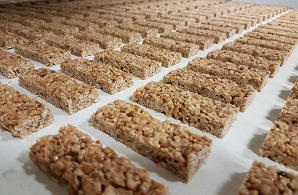
A team from the Department of Food and Nutritional Sciences are working on a new cereal bar project through the EIT Food-funded SuReBar project, a partnership between leading industrial bodies and the University of Reading.
The sugar in cereal bars comes predominantly in the binders that are used to hold the cereal components together. The binders may contain syrups such as glucose syrup or honey, sometimes in addition to sucrose.
Therefore, the sugars have both a physical function as a binder as well as providing sweetness.
Dr Julia Rodriguez Garcia, the project leader of SuReBar and Lecturer of Food Science and Technology at the University of Reading said:
“Cereal bars are considered by many consumers to be a healthy snacking alternative that’s suitable for a busy lifestyle, but the reality is they often contain between 13% and 40% sugar and may have little other nutritional benefit.
Our EIT Food project SuReBar creates cereal bars that would be much more appealing for people wanting a healthy snack. The cereal bars are being designed with 30.6% less sugar content, no added high intensity sweeteners, and higher levels of fibre than the standard alternative.
The development of SuReBar includes a mixture of inulin, dextrins and pectin fibres to achieve a similar texture as the full sugar cereal bars as well as incredo sugar, which is based on Douxmatok’s technology for efficient sucrose delivery to taste receptors, to achieve a similar sweetness as the full sugar cereal bar.
In particular, pectin fibres from Herbstreith & Fox, have been used in combination with Legria a newly developed ingredient from brewer’s spent barley grain which is high in fibre and protein. Our aim is also to maintain the sweetness of the reduced sugar products using technology from Douxmatok, where they combine normal sugar alongside hydrocolloids (complex nondigestible carbohydrates) to more efficiently deliver sugar to the taste receptors on the tongue.
The bars will achieve a healthier nutrition profile through the use of new food technologies, including:
- · 24.3 % less sugar using fibres and DouxMatok sugar technology.
- · 41% more fibre using inulin, dextrin and pectin
- · 13% more protein and 34% more fibre using Legria
The team behind SuReBar have run successful pilot plant trials and samples are now going to be analysed in terms of shelf life, and consumer acceptability. The plan is to continue working in the development of these sugar reduced cereal bars at Strauss to be able to commercialise them by Summer 2023 in Israel and in the future in other European markets.
